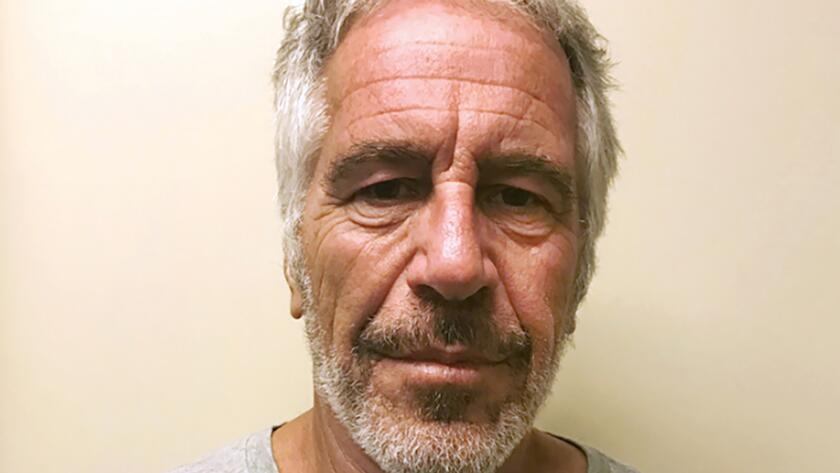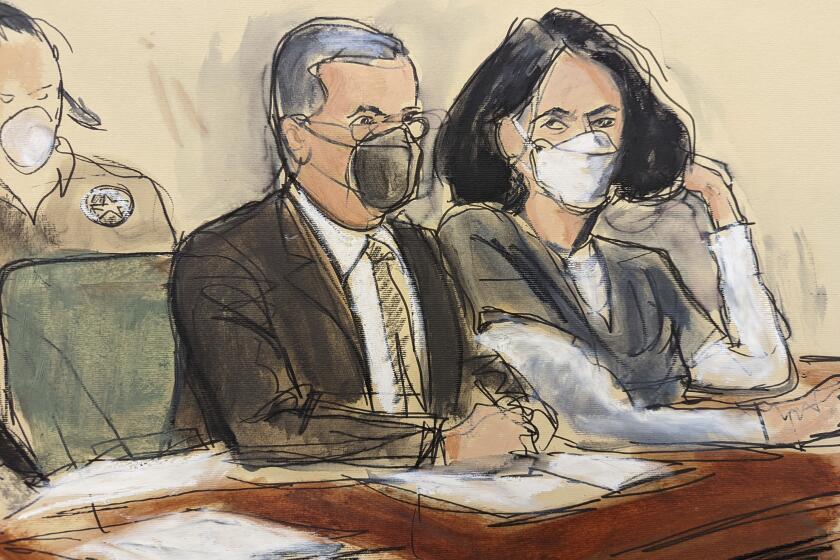How did Jeffrey Epstein die? New report details suicide, major lapses by prison officials
- Share via
Jeffrey Epstein, the financier accused of orchestrating a sex-trafficking ring involving girls, was able to kill himself amid lax oversight at the Metropolitan Correctional Center, according to a Justice Department report.
- Share via
Jeffrey Epstein, the wealthy financier accused of orchestrating a sex-trafficking ring involving girls, died by suicide and not foul play, according to a watchdog report released nearly four years after his death that highlighted negligence, misconduct and other failures at the New York jail.
Epstein, 66, was able to kill himself amid lax oversight at the Metropolitan Correctional Center a little over a month after federal authorities took him into custody, Department of Justice Inspector General Michael E. Horowitz said in a report released Tuesday.
“Numerous and serious” instances of misconduct and dereliction of duty contributed to a setting that allowed “arguably one of the most notorious inmates” in the Federal Bureau of Prison’s custody the opportunity to take his own life, Horowitz said.
JPMorgan Chase will pay $290 million to settle a class-action lawsuit brought by abuse victims of disgraced financier Jeffrey Epstein, who died in 2019.
Epstein was found hanging by a bed sheet in his cell on Aug. 10, 2019. At the time, he had pleaded not guilty to numerous charges and was facing up to 45 years in prison involving allegations of sex trafficking that dated to the early 2000s. The wealthy hedge fund manager, who once counted as friends former presidents Clinton and Trump, Britain’s Prince Andrew and lawyer Alan Dershowitz, died while in custody.
He was placed in a special housing unit on July 7, away from the general population and kept locked in his cell for 23 hours a day, according to the report. On July 23, 2019, after an apparent suicide attempt, he was placed on suicide watch, according to the report.
Initially, Epstein told staff at the corrections center that his cellmate had tried to kill him, but later he said he did not know what happened and didn’t want to talk about his injuries. Another inmate in the same unit reported hearing Epstein’s cellmate call for help and explain that Epstein tried to hang himself from his bunk-bed ladder, according to the report. In the special unit, staff were required to observe all inmates; conduct rounds and inmate counts; and search inmate cells, the inspector general’s report said.
Epstein was on suicide watch, but that status was removed the day after his attempt, according to the report. He also was housed with a cellmate, but the day before he died, his cellmate was transferred out of the detention center. The staff was aware that Epstein was alone but did not take steps to assign him a new cellmate. And staff did not carry out their responsibilities in the hours before Epstein’s death, according to the report.
Only one cell in the unit was searched on Aug. 9 and it was not Epstein’s. The report said that none of the required inmate counts were done after 4 p.m and staff did not conduct their 30-minute rounds after about 10:40 p.m.
“Had Epstein’s cell been searched as required, the search would have revealed that Epstein had excess prison blankets, linens, and clothing in his cell,” according to the report.
The staff also “falsified count slips and round sheets to show that they had been performed when they were not, leaving Epstein unobserved for hours before his death,” according to the report.
Newly obtained documents related to Jeffrey Epstein’s suicide underscore how fundamental failings at the Bureau of Prisons contributed to his death.
Two Metropolitan Correctional Center officers were criminally charged with falsifying records, but those charges were later dismissed when the employees complied with the terms of deferred prosecution agreements entered with the U.S. attorney’s office for the Southern District of New York, according to the report. One of the officers admitted that he had “dozed off” for periods of time while at work.
The report also noted that the video camera surveillance system in the special unit did not work — a long-standing issue in the detention center. While cameras provided live feeds to the staff’s monitoring stations, nearly all of the cameras in and around the special unit where Epstein was being housed stopped recording video in late July 2019 and were not working at the time of Epstein’s death, according to the report.
Two days before Epstein’s death, he met with attorneys at the corrections center, as he had on prior occasions, and signed a new last will and testament, according to the report. Officials at the corrections center said they were unaware of the new will until after Epstein’s death.
He also was allowed to make an unrecorded, unmonitored phone call before he returned to his cell, which was in violation of the Bureau of Prisons’ policies, the report said. He told staff he had called his mother, but he actually called someone with whom he had a personal relationship, according to the report.
There is also no evidence that contradicts the previous findings from the FBI that Epstein’s death was not the result of foul play. The New York City chief medical examiner also determined that Epstein died by suicide.
“While the [Office of the Inspector General] determined [Metropolitan Correctional Center] New York staff engaged in significant misconduct and dereliction of their duties, we did not uncover evidence contradicting the FBI’s determination regarding the absence of criminality in connection with Epstein’s death,” the report said.
Horowitz called the Bureau of Prisons’ failures troubling not only because staff did not keep watch over a person in their custody, but also because Epstein’s death prematurely ended the process of criminal justice. The staff’s failures “effectively deprived Epstein’s numerous victims of the opportunity to seek justice through the criminal justice process,” the report said.
Prosecutors said that Ghislaine Maxwell deserved 30 to 55 years in prison for helping financier Jeffrey Epstein sexually abuse underage girls.
While Epstein escaped a criminal trial, two major banking institutions have agreed to pay his victims.
On Monday, a U.S. district judge in New York gave preliminary approval to a $290-million agreement from JPMorgan Chase to settle a lawsuit out of court. The settlement was announced a month after Deutsche Bank agreed to pay $75 million to settle a separate lawsuit on similar claims, according to court records.
The plaintiff in the case, identified as Jane Doe 1, claimed that JPMorgan Chase provided Epstein and his associates hundreds of thousands of dollars in cash and access to wire services and other banking investment services between 1998 and 2013.
“We all now understand that Epstein’s behavior was monstrous, and we believe this settlement is in the best interest of all parties, especially the survivors, who suffered unimaginable abuse at the hands of this man,” JPMorgan Chase said in a statement earlier this month after the banking institution announced the settlement.
More to Read
Sign up for Essential California
The most important California stories and recommendations in your inbox every morning.
You may occasionally receive promotional content from the Los Angeles Times.


















